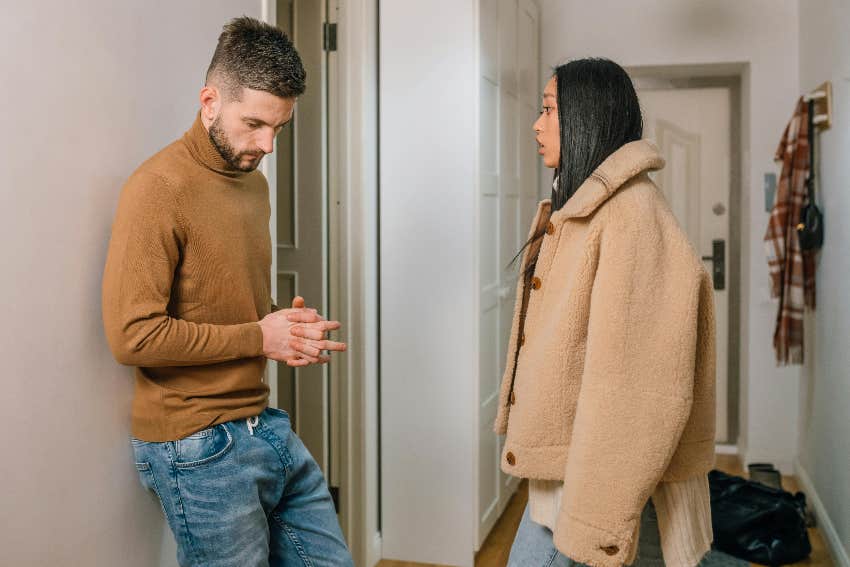I walked into the bedroom and found my husband watching television. It was Saturday afternoon and our children had games to get to. All of us were ready to get into the car.
“It’s time to go,” I said. “No one asked me what I wanted to do today,” said my husband. I was aggravated by his response.
“You decided what you were doing today,” I said, “when you became a father.” He was annoyed but got up to leave with us.
I shocked him by having such a rapid no-nonsense response to his childishness. Typically, I would simply plead with him to be rational or do the right thing.
But I was nearing my 40th birthday, I outgrew my husband; it was like being married to a frat boy.
Not long after, my husband began a weekly football escapade. He couldn’t miss watching football with his friends and he had to get wasted. Let me frame this properly. I met my husband in college. There wasn’t much to do in Scranton, Pennsylvania besides drink.
My husband was drinking more than my college boyfriend. And they were the same guy. I was thinking how is this possible?
Around this time, my boys and I were in a car accident. The cars in front of me stopped and I stopped behind them. We lived in a rural area outside of Washington, D.C. with winding country roads. I saw a car coming in my rearview mirror. I had only one thought: All three of my boys were in the car with me.
The old man driving the car hit us and threw us into the oncoming lane. The side of my front bumper got caught in the car ahead of us. It was a double-impact accident. I was so relieved the car seats had stayed secure.
I kept it together until the firemen arrived and I spotted a friend of my brother’s. It was like stimulus and response.
My brother was a firefighter too. A familiar face allowed the tears to flow because I was so relieved my children were okay. They urged me to go to the hospital but I refused. They told me that the force with which we were hit mandated getting checked out.
At the very least, they explained that since I braced for impact after seeing the car coming toward us, combined with the speed, I would have trouble moving in the days ahead.
I called my husband after our car accident and he showed no concern for his family.
Oscar Portan / Pexels
He finished his workday like any other day and arrived home at his regular time. The next day I could barely move.
It seemed the firefighters were correct. I got through as best I could but I was unable to carry our son upstairs. He was nearly a year and more than twenty pounds.
“I don’t think you can go away this weekend,” I said. “What do you mean?” said my husband. He had an Arizona football weekend planned with his buddies.
“I’m afraid I can’t take care of our kids,” I said. “I’m having a difficult time moving and as the day has gone on it’s getting more difficult. The firefighters tried to tell me this would happen because of the speed of impact but I didn’t believe it.”
My husband eventually canceled his trip. But he was not happy. You would think he would have been grateful his family was okay.
I walked past him in the garage the next day as he was sweeping. He was swiping that broom so furiously that it was hard not to notice his anger.
It was a full-on embarrassing and lacking self-respect adult tantrum. “What’s wrong?” I said. “I’m disappointed,” he said. “I wanted to go away.”
It was one of the first times I found my husband unattractive. It was gross seeing a grown man need to announce his mood to gain attention. Our children didn’t even do that.
Things were piling up. Emotionally my husband and I were no longer on a level playing field. I wanted to shout, “Grow up! You are blessed your family is okay.”
All my husband could focus on was a missed boys’ weekend — at this point, I had emotionally outgrown my husband.
 Alena Darmel / Pexels
Alena Darmel / Pexels
Research from 2021 found that people who stay in unhappy relationships will have higher levels of stress and depression. Was I conscious of this? Not entirely. I just felt annoyed and aggravated.
I felt shocked and turned off. But I was still deeply engrained in our less-than-healthy relationship. Research from the University of Toronto states that one of the reasons people stay in unhealthy relationships is fear of conflict, and being alone.
But I did remember something someone told me years before. It was floating in my memory. It was disappointing because I realized what my young self once discarded was coming true.
“You know,” said my sister. “A lot of marriages end because one person emotionally outgrows the other.” I deposited this wisdom in the recesses of my mind.
I was in my twenties and newly married. I didn’t think it applied to me. I now realize it did apply to me. I was nearing the age of 40 before I completely digested this. Before I was forced to pluck it from my memory. In between, wanting to yell at my husband to, “Grow up!”
In truth, you could simply say I outgrew my husband. It’s not even necessary to say I emotionally outgrew him. He wasn’t maturing at the same pace.
There’s a bit of controversy about whether or not you can emotionally outgrow your spouse. As a relationship columnist, I’ve spent more than a decade in the counseling and research of love, relationships, marriage, and divorce.
Emotionally outgrowing your spouse is recognized. At the same time, there’s a mitigating factor.
Can you outgrow your spouse — or are they simply who they were all along?
 Keira Burton / Pexels
Keira Burton / Pexels
And you have matured enough or evolved or grown enough to recognize this is who they always were. In other words, you haven’t necessarily outgrown them because you both aren’t evolving at the same emotional maturity. One of you hasn’t been stunted while the other grew.
You are both who you always were — only you’ve matured enough to recognize you’ve outgrown your spouse. I’m not gonna lie, even as a relationship expert it’s a lot to take in.
I’d have to say I agree with the latter. My husband and I weren’t moving through life and marriage together with one of us suddenly stunting our growth. We weren’t both suddenly becoming different people.
We were both who we had always been. I just realized I married someone who wasn’t fully an adult.
He was childlike if he didn’t get his way. He hadn’t evolved into full maturity. It appeared he had because he was professionally successful but he didn’t take accountability for all aspects of his life.
My husband was never going to move forward with me. We were 40 years old. It wasn’t my responsibility to tell him to be responsible.
Sadly, once I realized I had emotionally outgrown my husband I remained in our marriage for too long. It’s an unhealthy relationship phenomenon that the longer we stay in an unhealthy marriage the more difficult it is to get out.
We get worn down. We make excuses and we nobly (supposedly) attempt to rescue our marriage. I wish my twenty-something newlywed self had listened more intently the day my sister shared some undeniable wisdom.
Colleen Sheehy Orme is a national relationship columnist, journalist, and former business columnist. She writes about love, life, relationships, family, parenting, divorce, and narcissism.





